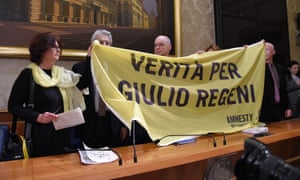
Egypt has postponed a meeting in Rome at which a Cairo delegation was due to hand over evidence relating to the torture and murder of the Italian researcher Giulio Regeni.
The highly anticipated meeting was scheduled for Tuesday but is now expected later this week. There is a growing perception in Italy that cracks are beginning to emerge in Egypt over how the government of President Abdel Fatah al-Sisi has handled the murder investigation.
Italy’s foreign minister, Paolo Gentiloni, will outline the government’s position on the case in a parliamentary statement on Tuesday, his ministry said.
Regeni’s body was found in a ditch off a desert road on 3 February, more than a week after the 28-year-old – a Cambridge PhD student researching labour unions in Egypt – disappeared.
Experts and activists have said the murder bore all the hallmarks of Egypt’s notorious secret service, but Egyptian officials have consistently put forward alternative theories, including that Regeni was killed by a criminal gang and that his death was an isolated incident.
Last month Egypt’s foreign ministry declared they had shot dead four members of a gang “specialised in impersonating policemen, kidnapping foreigners and stealing their money,” who they say killed Regeni.
Such theories – along with outlandish accusations against Regeni by Egyptian officials – have been flatly rejected by Italian authorities, who have demanded Egypt cooperate in Rome’s own investigation into the murder.

For weeks, Rome and Cairo have been engaged in a tense standoff, with one senior Italian senator saying Italy ought to consider recalling its ambassador from Cairo and declaring Egypt unsafe for Italian tourists if investigators are not forthcoming.
Reports in Egypt suggest the issue is generating criticism of the Sisi government domestically. On Sunday the editor of Egypt’s top newspaper called on officials to deal with the Regeni case in a straightforward manner, saying that if they failed to do so it could begin to resonate in Egypt in the same way as the 2010 murder of Egyptian youth Khaled Said by police, which ultimately ignited an uprising that led to the ousting of Hosni Mubarak.
“The Khaled Said case, despite its circumstances, did not go away like some thought at the time,” said Mohammed Abdel-Hadi Allam, the editor-in-chief of al-Ahram. “The naive stories about Regeni’s death have hurt Egypt at home and abroad and offered some a justification to judge what is going on in the country now to be no different from what went on before the January 25 revolution.”
Another newspaper, al-Shorouk, reported on Monday that the make-up of the Egyptian delegation due to visit Rome was still undecided.
The Italian prime minister, Matteo Renzi, is under pressure to secure progress in the case, especially after Regeni’s mother, Paola, offered powerful testimony before parliament last week about how severely her son had been tortured, saying she had recognised him only from the tip of his nose.

Raffaele Marchetti, professor of international relations at Luiss University, said the view in Rome was that the delay seemed the result of internal issues in Egypt. “It seems that there are different parts of the Egyptian establishment that are fighting and these are interpreted as cracks. It might be a good sign to some extent; we are not yet close to a solution but at least things are moving,” he said. “Of course you don’t send a delegation if there is no consensus at home.”
The Egyptian delegation was meant to bring certain evidence that was demanded weeks ago by investigators in Italy, including mobile phone records that could help identify where Regeni was when he disappeared and where he might have been taken.
Marchetti said Italy was unlikely to break diplomatic relations with Egypt over the case, not only because the two countries shared mutually beneficial business and economic interests, particularly involving the Italian oil giant Eni, but because Egypt was an important ally in Italy’s interests in Libya.
But he said Italy needed to see Egypt identify a true culprit in the case and bring the issue to trial. “If this is something that has been led by [Egyptian] institutions … of course the Italian government does not expect to incriminate top players close to Sisi, also because this would weaken the Sisi government that is considered an important ally,” he said. “It is hard to predict but I think the most likely solution would be to implicate a mid-ranking official, because Italy cannot accept no incrimination.”
Marchetti said the murder of Regeni could be presented as a “crazy, independent action” by an official who “had a different agenda or did things wrong”.
In rare cases, Egypt has pointed a finger of blame at an official within the state following a high-profile murder or other controversial case, but in those instances the sentences are usually short or commuted, according to Michele Dunne, director of the Middle East programme at the Carnegie Endowment for International Peace in Washington.
Dunne said the Regeni case was being closely followed in the US capital, and it was believed that human rights issues were raised at a recent meeting between John Kerry, the US secretary of state, and Egypt’s foreign minister, Sameh Shoukry.
“It depends at the end of the day how persistent Italy will be in this and whether others raise the case, whether they [Egypt] have to call someone to account. But the history of these things is that normally there isn’t really transparency at the end of the day,” she said.
The US state department declined to comment on whether Kerry had specifically raised the Regeni case, but an official told the Guardian: “The details that have come to light raise questions about Mr Regeni’s death that can only be answered through an impartial and comprehensive inquiry.
“We continue to call on the government of Egypt to ensure the investigation is conducted in a full and transparent way, and to fully collaborate with the Italian officials who are part of the investigation.”
[Source:- The Guardian]





